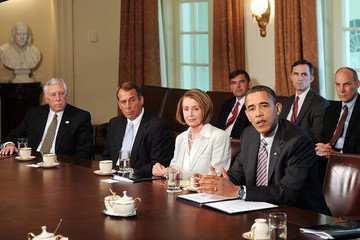
Under a dictatorship, it’s easy to blame the dictator for all the pain and trouble in the society under his rule.
In a democratic republic, you have to blame the people who vote for the reprehensible leaders.
Let me explain. In poll after poll, a clear majority of Americans believe the following:
In general, and in the abstract, government spending should be cut.
In any specific case, with any specific government program, spending should not be cut. In fact, it should be increased.
In general, taxes should be cut — if not eliminated — for the middle class, although the benefits of government programs should keep flowing freely.
A small majority probably believe that taxes should be cut, or at least not raised, for “the rich” i.e. people who make above $199,999.99 per year.
Now, what happens when a majority of the population holds such self-evidently contradictory views? How can government take less from the population and spend more? How can a majority favor spending cuts in the abstract (the message of the 2010 elections) while favoring government expansion on specifics (the message of the 2008 elections)?
Contradictions cannot exist in reality. When a person wants contradictory things, terrible things result. In a psychological context, some degree of mental conflict, disorder or even chaos results. In a social-political context, you get dysfunctional and, ultimately, disastrous political leaders (from all major parties). In a democracy, unlike a dictatorship, these political leaders and policies are a symptom, not a cause. They are a symptom of the underlying contradictions of the majority of individuals who keep voting for them.
It’s true that a great majority, in poll after poll, show an intense dislike for politicians in both parties. However, what chance would a politician with opposite political views have in an election against one of these despised politicians? What would happen to a politician who ran on a serious platform of massive government spending cuts, including the elimination of entire Cabinet departments, preservation of Medicare and Social Security in the short-term, with mandated privatization over the long run? Such a politician would not even launch a campaign, because he or she would stand no chance whatsoever in winning a majority (or even a sizable minority) of the American electorate.
People who agree with me complain that Americans are “selfish.” Self-interest is not the problem. Rationally self-interested people take care of themselves, and would never support the use of government coercion to “help” them. Likewise, rationally self-interested people resent and oppose the use of government coercion to force them to “help” others. The problem is the ideology of self-sacrifice. Politicians rely on the neurotic guilt of their victims (the producers) to get the loot they want for their constituents. The neurotic guilt of their victims is the result of the ideology of self-sacrifice, the false and destructive view that people must sacrifice themselves for one another, regardless of the consequences to self or others. If Americans were more selfish, in the rational sense, politics and wealth redistribution as we know it would come to an end. America would become a free country, a much more prosperous and stable one than it presently is. They would elect the politicians able and willing to bring this about, rather than the ones they keep electing.
America’s enemy is America itself. Yes, Americans suffer under the political rule of disingenuous, duplicitous and generally despicable politicians. But by refusing to even consider opposing views, and by holding on to massively contradictory ones, it’s clear that most Americans, to date, would not have it any other way.
